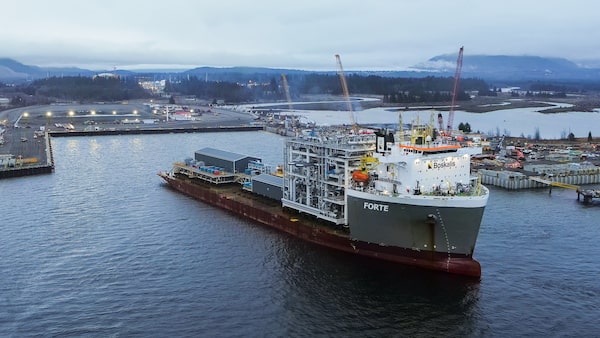
A module more than 10-storeys tall arrives aboard a vessel at Kitimat, B.C., on March 10.Courtesy of LNG Canada
Greater investment is needed in renewable energy and clean technology to help reach climate goals even as the world consumes more fossil fuel, the International Energy Agency says.
After COVID-19 pandemic restrictions began easing in 2021, global demand for oil and natural gas gradually picked up and then rose further after Russia’s invasion of Ukraine four months ago.
European natural gas prices have been volatile, hitting record highs before falling as fears eased about the severity of shortages of the fuel. Prices have rallied again in June.
Fatih Birol, the IEA’s executive director, said government and industry players cannot afford to ignore climate change during the current global energy crisis. “We can tackle both at the same time,” he said during a webcast on Wednesday from Paris.
Mr. Birol raised the possibility of Europe having to dramatically shift energy sources in the long term if natural gas from Russia is eventually cut off. Already, there has been a sharp rise in imports of liquefied natural gas into Europe, which also plans to increase consumption of thermal coal to generate electricity.
“The growing worries in energy security means growing investments in coal,” Mr. Birol said.
Russia supplied nearly 40 per cent of the Europe Union’s total consumption of natural gas last year.
The Shell PLC-led LNG Canada project is the only LNG export terminal under construction in Canada. LNG Canada’s exports to Asia from Kitimat, B.C., are scheduled to start in 2025.
Tim Gould, the IEA’s chief energy economist, said a surge in investment in renewables and cleantech is required to speed up the transition toward clean energy and away from fossil fuel. “That’s the way that we can find lasting solutions to our energy and climate crisis,” he said.
Mr. Birol and Mr. Gould made the comments after the IEA released its annual World Energy Investment report, which highlighted the importance of nurturing clean energy investments in a wide range of areas such as solar, wind power, batteries and electric vehicles, as well as technology that includes carbon capture.
The IEA said investment in sectors related to clean energy grew by an average of 2 per cent annually in the five years after the signing of the 2015 Paris agreement on climate set country-specific targets for decreasing carbon emissions. Since 2020, the annual growth rate has jumped to an average of 12 per cent for investments in clean energy – “well short of what is required to hit international climate goals, but nonetheless an important step in the right direction,” the new report said.
Total spending in clean energy globally is forecast to rise to US$1.4-trillion this year.
“Where does this crisis leave fossil fuel producers? In the short term, it leaves most of them considerably wealthier,” the IEA’s report said. “High prices are generating an unprecedented windfall, especially for oil and gas suppliers.”
Windfall gains by oil and gas producers present an ideal opportunity for them to diversify and invest in clean energy, Mr. Birol added.
The IEA estimates that investment in clean energy accounted recently for 5 per cent of spending by oil and gas producers worldwide, compared with only 1 per cent in 2019.
Globally, there is momentum behind early-stage technology, with startups in the United States and Europe raising record funding, including for energy storage and hydrogen. “The momentum behind low-emissions hydrogen has been reinforced by Russia’s invasion of Ukraine, which has bolstered policy support, especially in Europe,” according to the IEA report.
Canada is seeking to hit emission-reduction targets to reach net zero by 2050, with hydrogen and carbon capture expected to play key roles in decarbonization.
The IEA report has examples of cleantech innovation that include Ballard Power Systems Inc. and Svante Inc., both based in Burnaby, B.C.
Ballard produces hydrogen fuel cells while Svante is gradually scaling up in the business of capturing carbon dioxide from smokestacks.
It’s unclear how much funding will be made available by investors for renewables and cleantech worldwide in the years ahead.
“The strategic importance of energy innovation, including research and development, and demonstration, remains as high as ever,” according to Wednesday’s report. “Without a significant increase in energy innovation spending, climate goals and long-run economic prospects are at risk.”
Your time is valuable. Have the Top Business Headlines newsletter conveniently delivered to your inbox in the morning or evening. Sign up today.
 Brent Jang
Brent Jang